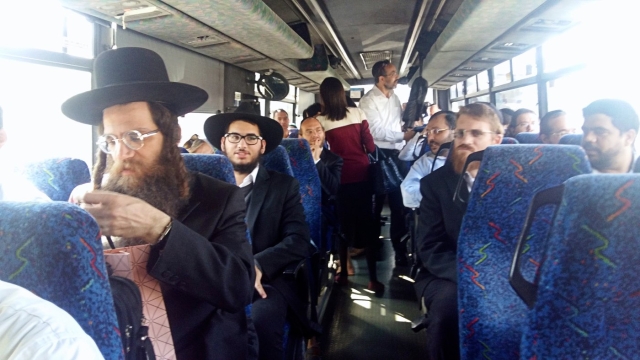In the juxtaposition of Tel Aviv's high-tech skyscrapers and Bnei Brak's traditional enclave, Israel presents a study in contrasts. While Tel Aviv stands as a beacon of technological advancement, Bnei Brak serves as a stronghold for the ultra-Orthodox, or Haredi, community. The two worlds appear to be light-years apart: in Bnei Brak, modern amenities like smartphones and television are often considered threats to spiritual integrity rather than tools of convenience. However, as published by The Guardian, it seems as if there is one company that is trying to bridge this vast gap.
The Haredi community, though distinct, is far from insignificant in Israel's demographic landscape. Accounting for approximately 13% of the nation's population today, projections indicate that by 2050, this group will make up one-fourth of all Israelis. Despite their increasing numbers, the Haredi remain largely marginalized, both socially and economically, from the rest of the country. This detachment is multi-layered; it's evident in the community's reluctance for military service, the high levels of poverty, and their preferential commitment to religious studies over conventional employment. Additionally, this separation feeds into broader political divides, particularly concerning the role of religious customs in public policy.
4/ What are the implications of this education system on the future integration of Haredi into the workforce?
— Israel Democracy Institute (@IDIisrael) June 22, 2023
Dr. @Gilad_Malach explains some of the intricacies of ultra-Orthodox education in Israel in light of the recent controversies concerning budget allocations and coalition… pic.twitter.com/10XYjoFGhW
Within this intricate socio-cultural tapestry, though, lies a kernel of change. Enter the Mego program, a transformative 14-month vocational course located near Tel Aviv's diamond district. Spearheaded by a group of visionary entrepreneurs, Mego aims to equip Haredi men with the skills needed to join Israel’s burgeoning tech sector, all without demanding any compromises on their religious convictions.
Yitzik Crombie, the mastermind behind Mego and the founder of BizMax—an accelerator designed exclusively for Haredi entrepreneurs in Jerusalem—is optimistic. He argues, “People might view this as an idealistic endeavor, but I find no inherent conflict between a life of spirituality and economic well-being.” Considering that a mere 3% of Israel's tech workforce is Haredi, Crombie's endeavor could represent a watershed moment for the community.
Recruiting Israel's Arab & Jewish-Haredi communities lies at the basis of a recently adopted plan to boost the country's #tech workforce. It includes new programming in schools around the country focusing on technical and #digital proficiency.https://t.co/hzEhtU3ruN
— Yehuda Yaakov (@YehudaYa) October 2, 2022
The ripple effects of the Mego program are already discernible. The enthusiasm within the classrooms is infectious, where Haredi men, aged from their early 20s to their 40s, are engrossed in learning programming languages. This shift from traditional religious studies to STEM fields is indeed groundbreaking, and their eagerness is palpable.
Funded through a partnership between the Kemach Foundation and the Israeli government, Mego has experienced a surge in demand. The program commenced with an inaugural batch of 100 students and saw that number grow to 150 in its subsequent cycle. The sheer volume of applicants, numbering in the thousands, speaks volumes about its societal impact.
Admission to Mego involves a rigorous selection process that includes academic and psychological assessments. The aim is to ensure that candidates are intellectually suited for the coursework and are psychologically prepared to adapt to a secular working environment, often inclusive of women and LGBTQ+ individuals. Tomer Shor, an instructor at Mego and an accomplished tech entrepreneur, notes that the students also need to acquire a set of 'soft skills,' such as problem-solving and time management, essential for modern workplaces.
My Haredi cousin has 17 children. There are now 1 million.
— MUSK ANTISEMITISM ROW🔥🇺🇦🇮🇳ISRAEL💥 IRAN💣🇮🇳 (@IranLatestNews) August 27, 2023
They are antizionist.
They don't recognize Israel.
Refuse army service
Refuse to work (the men)
Control the government.
Completely corrupt.@moutet @NTarnopolsky @haaretzcom @emilykschrader pic.twitter.com/pZXxfM5zXl
Amidst these challenges, the Mego community exhibits a vibrant startup-like atmosphere. With its first batch of students poised to graduate, many have already begun to secure internships and job interviews in Tel Aviv’s tech firms. For participants like Aziz Solomon, a 34-year-old father, the program is not merely an educational venture but a life-altering experience. “The world is evolving, and we must adapt,” Solomon remarks.
In sum, the rise of programs like Mego signals a potential watershed moment for the Haredi community and, by extension, for Israeli society at large. It offers a route toward economic integration that doesn't require a trade-off with deeply held spiritual beliefs.


